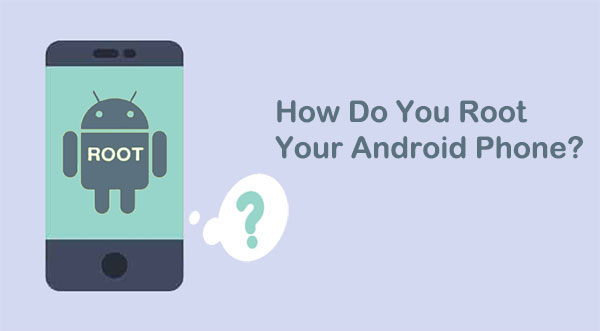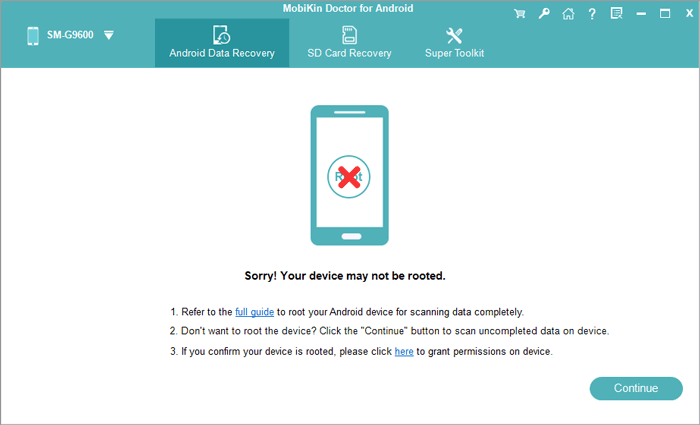What Does Rooting a Phone Do? Explanation, Pros, Cons, User Guide, & FAQs
"What does rooting your device do, and what is rooting?" -- from Reddit
By gaining root access, users can delve deeper into their device's operating system. So, what does rooting a phone do? Rooting a device, akin to jailbreaking an Apple iPhone, unlocks a world of customization. But when do users feel the urge to embark on this journey of unlocking their device's full potential? Typically, it's when they crave more control over their device, desire to optimize performance, or seek to explore new features beyond the manufacturer's limitations.
Well, this post will delve into almost everything you need to know about Android rooting. From the benefits and risks to the step-by-step process and troubleshooting tips, we'll cover it all.
Part 1: What Does Rooting a Phone Do
When you first get your phone, it's akin to being a user on a company network: limited access, a fixed interface, and default programs that can't be removed. This setup offers protection for both the phone and the user. Rooting an Android device grants superuser access, similar to jailbreaking on Apple devices. Manufacturers and carriers impose limitations on smartphones for protection.
What does rooting do? With root access, users have complete control over the operating system, similar to administrator privileges. Android's Linux-based OS incorporates standard Linux functions, providing superuser permissions.

You May Like:
- Top 10 Android Rooting Software & Apps [with/without Computer]
- Everything You Should Know about Jailbreak Remove MDM [Guide 2024]
Part 2: Is It Safe or Risky to Root Android Phone
In a narrow sense, rooting an Android phone can be risky. While it depends on your device and technical expertise, we generally advise against it. By bypassing the device's built-in security measures, you expose yourself to higher security risks and potential damage, for the rooting may void your warranty and might expose your device to malware.
However, it is safe in a broader sense. For instance, you're knowledgeable and there is no need to bear more losses for the possible risks of mobile phones. Even so, you are advised to run a thorough malware scan after rooting your device.
Rooting any device with manufacturer permission is legal, including tablets. However, in the U.S., rooting tablets is banned under a 2012 DMCA amendment. Tablets were excluded due to their broad classification.
Part 3: What Are the Benefits of Rooting Android
Rooting an Android device removes manufacturer restrictions, granting users control and customization options. Despite security risks, rooting empowers users to secure their data and tailor software to their needs, offering attractive benefits. Here's why root Android phones:
- Performance Boost: Enhance device speed and responsiveness.
- Prolonged Battery Life: Optimize power consumption for longer usage.
- Remove Pre-installed Apps: Clean up your device and easily hide apps you don't want others to see.
- Install Unauthorized Apps: Access apps unavailable on official stores like Google Play and use root access applications that interact directly with system files.
- Change Device Functionality: Escape factory presets and uses custom firmware to tweak how your device operates.
- Block Ads: Modify host files to block ads on browsers and apps, enhancing internet speed and providing ad-free browsing.
- Space Optimization: Remove pre-installed bloatware to free up memory for essential files and apps.
- Data Backup Control: Choose where to store backup data, providing more control over your files and confidential information.
- Overclock Processor: Increase speed beyond official limits, boosting performance but risking battery degradation and overheating.
- Underclock Processor: Slow down the processor to reduce power consumption and extend battery life, though at the expense of performance.
- Operating System Enhancements: Modify system settings for improved functionality.
- OS Flexibility: Install custom ROMs and alternative software kernels to update to the latest Android OS, even on older devices.

Further Exploration:
Part 4: What Are the Drawbacks of Rooting Android
In addition to the appealing benefits of rooting (jailbreaking) Android phones, you might potentially face some of the following risks akin to the two sides of a coin:
- Device Bricking: Rooting can render your device unusable if done incorrectly. Then, you may need to restore files from a bricked phone.
- Warranty Voidance: Rooting typically voids the warranty and may lead carriers to refuse service.
- Increased Malware Exposure: Rooted devices are more susceptible to malware, requiring cautious app selection.
- Malicious Rooting Apps: Some rooting software may contain malware, compromising device security.
- Restricted Access: Some streaming services and financial institutions may block rooted devices from accessing their apps or sites.
- Security Risks: Rooting can disable built-in security features and prevent the installation of updates and patches
- Device Instability: Mistakes during rooting can render the device unusable, causing irreversible damage to the software.
- Potential Data Loss: Rooting might result in data loss from the device, further complicating the process.
- Payment and Banking App Disabling: Rooted devices may lose access to payment and banking apps.
- Functionality Loss: Rooting can disable core features like the camera or fingerprint scanner.
Note: Rooting may prevent your device from receiving official Over-The-Air (OTA) updates directly from the manufacturer. However, you can often manually update your device by flashing official firmware or custom ROMs.
Part 5: How to Root Android Phone
Rooting an Android device offers more control and flexibility; please weigh the pros and cons of rooting Android first. Rooting methods vary by device, often involving exploits to bypass security measures in the firmware, and if you proceed, follow the general guide:
- Back up your device data to a secure storage like a computer.
- Ensure your battery is fully charged.
- Install the correct driver on your PC for device interaction.
- Decide on the tools like iRoot, MobileGo, KingoRoot, Root Genius, or Root Master.
- Review a tutorial either on the tool's interface or the website tailored to your device.

Before and after rooting your device, prioritize security to mitigate risks. Install trusted antivirus protection and download apps exclusively from secure sources. For instance, use robust security software like Avast Antivirus, Norton Security, or McAfee Total Protection to stay protected.
Q&A about Android Phone Rooting
Q1: How to tell if a phone is rooted?
- Use Root Checker apps from the Google Play Store.
- Check for root-related files like "su" or "Superuser.apk".
- Test root-only apps for functionality.
- Look for custom ROM installations.
- Check system settings for developer or root access options.
- Check root status with MobiKin Doctor for Android and recover data from Android without backup.

Q2: Why can't I root my Android device?
You may be unable to root your Android device due to reasons like device compatibility, software version, security measures, technical knowledge, risk of damage, and legal restrictions. It's essential to research thoroughly and understand the disadvantages involved before attempting to root your cell phone.
Q3: How can I troubleshoot rooting errors?
If you encounter problems like device bricking during rooting, troubleshoot by booting your phone into recovery mode, clearing the cache partition, or performing a full factory reset if needed.
Q4: Can I unroot my phone if I change my mind?
Yes, you can typically unroot your phone by using specific apps designed for the purpose. However, unrooting may not restore your device's warranty or undo any damage caused by rooting.
Words in the End
In conclusion, rooting a phone offers a plethora of opportunities to customize, optimize, and explore the full potential of your Android device. However, it's not without its risks and considerations. By understanding the ins and outs of this topic, hopefully, you can make informed decisions and unlock a whole new realm of possibilities for your smartphone. Finally, feel free to share this page on social media to help more individuals discover its benefits and steer clear of potential pitfalls.
Related Articles:
How to Recover Deleted Text Messages on Android without Root [Best Practices]
Best Root File Manager to Help You Manage Rooted Android Devices
10 Best Android Backup Apps without Root [Most People Don't Know]
How to Recover Data after Factory Reset Android with/without Backup? [Fixed]

